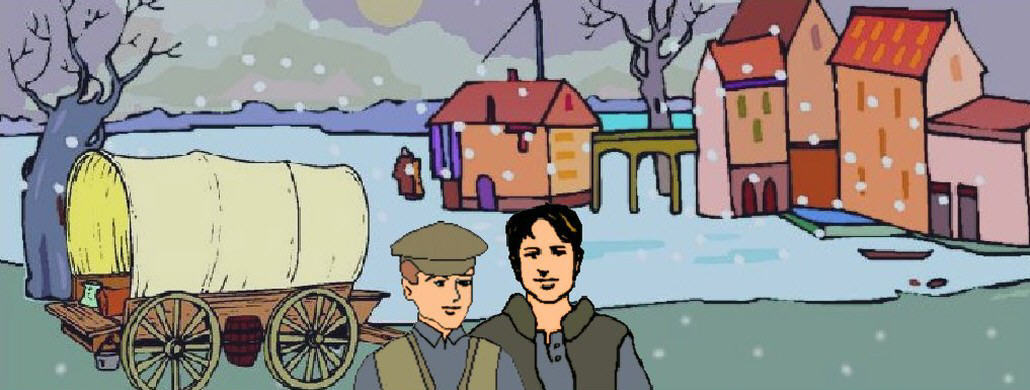
[Rhineland, around 1815] After 20 years of war, life in the countryside was very hard. Many soils were ruined, there was too little to live on, almost no medical care and infant mortality was very high.
Then, in winter 1816/17, several bad harvests led to a famine.* Hunger and despair drove many people away from their homes, in those years mass emigration to America began.
Restoration
After the victory over Napoleon, the statesmen of Europe gathered at the Congress of Vienna restored the old order. The whole of the Rhineland, Westphalia, and some other territories fell to Prussia. The German states remained and grouped together into a loose “German Federation” (1815-1866). Its supreme authority was the parliament in Frankfurt. Yet, its members were not, like today, freely elected representatives, but envoys of the individual states, Austria had the presidency. The monarchs were satisfied, but many people were deeply disappointed.
A time of restoration began. Furthermore, king Frederick William III of Prussia broke his promise to give his people a constitution. More than anyone else, the Austrian statesman Prince Metternich dominated this time. In his eyes, freedom of opinion, freedom of the press and freedom of assembly as well as the struggle for national unity meant agitation and a threat to security – therefore, he and other princes oppressed them by might and main. They prohibited the Burschenschaft student movement, who struggled for a unified German nation and a progressive, liberal political system. Moreover they put professors and students under supervision by the state, and censored newspapers and books. Suspicious persons were considered demagogues and prosecuted. Among them were men of great merits like the Prussian statesman and generals.
The Bergmann family worries
Also Hedy Bergmann worried a lot, she knew that their farm could not produce enough to feed all of them. Again and again she thought of Johann’s offer to come over and live with him in America. She knew she could count on him, and yet it was hard for her. Heinrich conjured her: “Mother, I love my homeland, and during the terrible months in Russia, the thought of you and home kept me alive.
But look around you, how can we get enough to eat for all of us? When we give the farm to Uncle Ewald, at least he and his family will have enough to live from, and we will build a new life for us over there in America with Johann and Laurie. And that is what we deserve, mother, a life! Over there, in the New World, they have even written it down in the Declaration of Independence. Life, Liberty and the Pursuit of Happiness, for all people, and all men are created equal!”
The decision
His brother Niklas had been silent all the time. How could he, with his stiff leg, help his family? Finally he said: “Mother, Heinrich is right, you two should build up a new life for yourselves with Johann.” Heinrich knew what was going on in his brother. “It’s the three of us or no one at all,” he said firmly, “and you, my brother, you will draw and write. Remember how you drew a lot of comrades still in the field, and for some of you even wrote letters. How many could have hardly stayed in touched with their families if you hadn’t been there for them? Don’t think that a man with a bad leg does not have anything to give to others anymore. Of course you will come with us!”
* Today we know that it had to do with the eruption of Mount Tambora in Indonesia. The eruption caused global climate anomalies, and 1816 became a “Year without summer”.

Be the first to comment